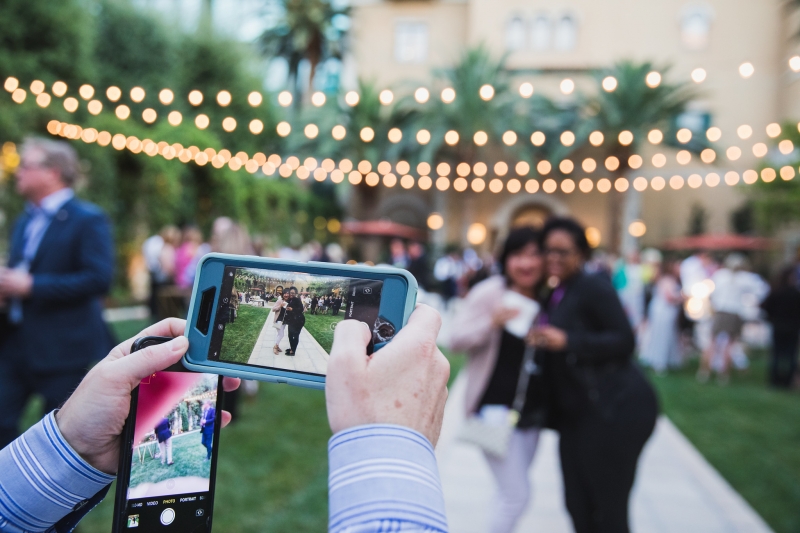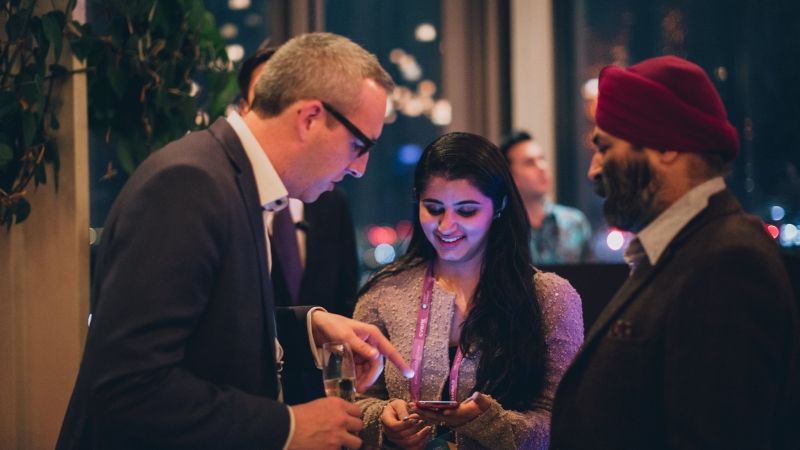How to Create a Social Media Plan for Your Events
To set your brand apart, you need to create a stellar social media plan that not only engages attendees but also gets your brand noticed. After all, promotion on social media is far from over once your attendees walk onto the event floor. Find out how to create a rock-solid social media strategy for events that lets you harness the full power of digital, from start to finish.

Social Media Event Strategy
A lot goes into creating a robust social media event strategy. From deciding which platform to choose and which hashtags to use to setting SMART goals and creating content, your strategy will dictate what and how your event-related information is disbursed on social media channels.
For simplicity’s sake, let’s divide the social media event strategy into before, during, and after the event to show you how to create a killer digital experience for your guests.
Before the Event
The key to an effective social media strategy is to prioritize reach, connection, and anticipation for the event. Here are some ways you can achieve all three:
1. Identify Your Target Audience
You don’t want your efforts to be too broad. Take advantage of the demographics of your target audience to get insights into where you should concentrate your efforts.
2. Select the Ideal Social Channel
To identify the right social media channel, look at your company’s previous engagement performance on all the platforms so that you can make an informed decision.
3. Use Hashtags
A social media plan for events should include a #memorablehashtag consistent with the event’s branding. Use this hashtag on all your social media updates, sponsors’ websites, online newsletters, and email signatures.
4. Engage Influencers
Reach out to influencers relevant to your target audience. Explain why you are reaching out, give details about your event, and describe what you want from them. If your industry influencers shut the door on you, don’t worry. All’s not lost. Reach out to your event speakers or guests to spread the word about your event.
5. Ensure Consistency
For a strong brand recall value, prioritize consistency across your social media presence, ensuring all the posts have the same colors, logos, and tone.

6. Post Regularly
If you post too often, people will tune you out. Don't send a barrage of messages every day. Instead, create content that will pique the interest of your followers.
7. Create Teaser Posts
If you want to excite your followers, include teaser posts for events in your social media strategy. For inspiration, you may want to look at how Marvel promotes Avengers on social media. For a Marvel fan, seeing a well-designed image with the Avengers logo and a date far away in the future is enough to generate real excitement.
8. Create a Facebook Event
500 million people each month use Facebook Events as part of their social media strategy. Facebook Events has great features, including ticket sales and discussions. But with over 47 million public Facebook events created, you need to remember a few points to stand out from the crowd.
When building your next Facebook Event, follow these best practices:
- Select a cover picture with at least a 1920×1080 dimension
- Be specific and upfront about the time, location, and category so that Facebook can better promote your event
- Create a compelling event description
- If you're selling tickets, make sure your ticketing link stands out
- Include all the event-related information your attendees will need
- Tag invited speakers and guests
- Regularly post announcements or answers to questions that your guests may have asked.
During the Event
Amplify networking among your attendees and hosts using these social media strategies during the event.

1. Identify Live Streaming Opportunities
Live streaming is increasingly becoming popular on Facebook and YouTube. Use this to your advantage by incorporating it during your next event. You can use live streaming for a keynote speech or other opportunities like interviews.
2. Promote Your Hashtag
Make your hashtag visible in public spaces so that people will use it when sharing your event content on social media. Some places to post your hashtags are photo booths, printed materials, and photo-worthy locations.
3. Use Video on Social Media
Instagram, X (Twitter), TikTok, Threads...the list goes on. It's very easy to create videos you can share instantly with your audience at your events. This will boost engagement and encourage people to post live pictures, texts, reactions, and videos of their own with your dedicated hashtag. Display these posts on your social channels to turn your audience into active participants.
After the Event
1. Create Videos
More video! Post-event videos with interesting content to drive further engagement. To ensure your social media plan for events is successful, ask your attendees to share event videos and reward those that do. Be innovative when thinking about what content to post and what prizes to gift.
2. Ask for Testimonials
As part of your social media strategy for events, use an online survey tool to get a pulse check of your event’s performance. Send these surveys directly to your attendees’ devices and send a targeted, friendly reminder on social media. Make sure to ask some open-ended questions that can be used in testimonials
3. Feature Event Testimonials
Find testimonials of your attendees from Instagram captions, tweets, and Facebook ruminations and use them for advertising your next event. If you don’t plan to hold an event soon, use the posts on your feeds and tag the attendees in your post. People who post great stuff about your event on social media provide an incredibly valuable opportunity for engagement and even referral marketing!
Social Media Channels to Use for Marketing Events
There are so many social media channels available, and you should use as many as possible when implementing your digital event promotion strategies. Your In-person events provide myriad opportunities for generating valuable content that you can use on your social media platforms that will engage your attendees, create a sense of community, and extend the life of your event.
Take a look at the ways you can use popular social media platforms to market your events.
As noted before, Facebook events are an amazing tool that can help you expand your event's reach. That's not all Facebook has to offer, though. You can create Facebook groups for prospective attendees, first-time attendees, local attendees, or any other groups you think might like to come together online. You can also create targeted ads and share updates on your corporate page. Don't forget to create a page for your event as well as a memorable #hashtag to help build buzz around your event.
X (Twitter)
X offers similar benefits to Facebook and is a great platform for event promotion, including targeted ads and live updates.
You can't neglect your corporate LinkedIn page when planning events. Not only do you want your event to be clearly associated with your corporate brand, but if your event caters to professionals in your industry, posting on LinkedIn and creating event pages can help you reach individuals in your industry who might already follow your company. It's also a great platform to use your personal page to promote your events, as you'll also be able to mine your own network for prospective attendees.
Instagram and events share a critical characteristic: they're both highly visual! Your events should be just as beautifully crafted as your Instagram feed, and when the two come together, it's magic. Share everything from event graphics and testimonials to speaker snippets and behind-the-scenes content to draw in attendees. Whether you're sharing last year's content or streaming what's happening live, Instagram is a great place to generate some serious FOMO.
YouTube
Video content is huge right now, and not just in short bursts like on TikTok. YouTube draws in a huge audience and offers the flexibility to post long- and short-form content, including speaker highlights, customer testimonials, high-profile interviews, and event live streamed event content.
TikTok
Once again, videos are huge. And for the younger generations, TikTok is the current social media of choice for short snippets of engaging video content. Unlike YouTube, TikTok is geared toward shorter, themed video content that captures the viewer's attention immediately and doesn't have to hold it for long. That means catchy music, funny challenges, and interesting video snippets. The point of TikTok is to entertain, so any content you choose to promote here should aim to do just that.
While Pinterest might once have been used primarily as a visual board of images and rough ideas, it's actually a great tool for driving organic traffic to your event website through the use of interesting visuals. Have an awesome welcome sign for your event? Tac it to your event's Pinterest board, and show off your beautiful event décor! Found an article that's relevant to your industry, event location, or attendees? Add it to your board!
There's so much content you can find and create that will draw in prospective attendees, and Pinterest allows you to share it all in a visually appealing way.
Crafting Your Social Media Plan
A well-executed social media strategy is crucial for event success. With a carefully crafted social media plan, you can engage attendees, build anticipation, extend the reach of your events, and create a memorable digital experience that sets your event and your brand apart.
As you craft your event marketing plan, consider the benefits and capabilities of each social media channel and how you can implement different strategies before, during, and after your events.

Hope Salvatori
Hope is a Senior Content Marketing Associate who has been with Cvent for more than two years. She has 8 years of experience producing content for corporations, small businesses, associations, nonprofits, and universities. As a content professional, she has created content for a wide range of industries, including meetings and events, government and defense, education, health, and more.


